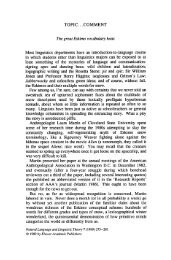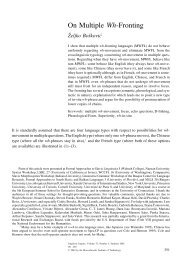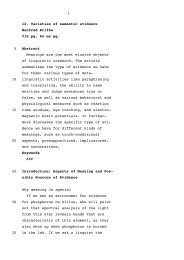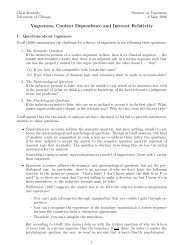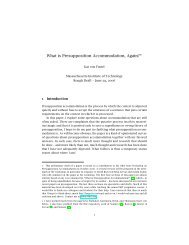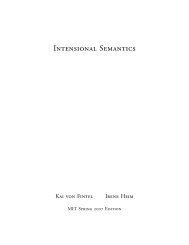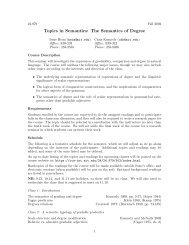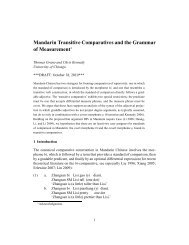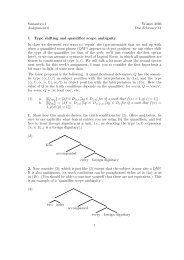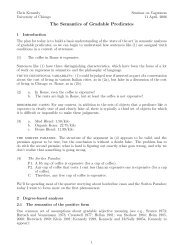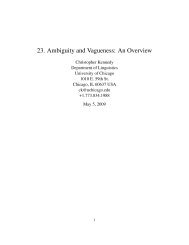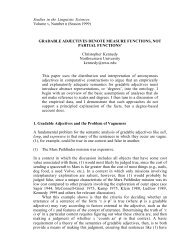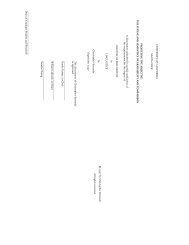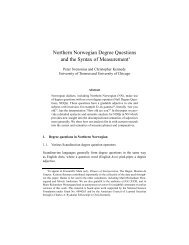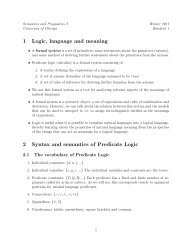On the natural history of negative polarity items - Syntax, Semantics ...
On the natural history of negative polarity items - Syntax, Semantics ...
On the natural history of negative polarity items - Syntax, Semantics ...
You also want an ePaper? Increase the reach of your titles
YUMPU automatically turns print PDFs into web optimized ePapers that Google loves.
Magdalena Kaufmann & Stefan Kaufmann<br />
f ,g ⇤ {r ⇤ D s((st)t)) | ⌅p[p ⇤ r ⇥ BS(p ⇤ r)]} Authority Condition (AC)<br />
b. When uttering <strong>the</strong> imperative, S believes that H is not already independently determined to<br />
ei<strong>the</strong>r do p or not do p. Epistemic Uncertainty Condition (EUC)<br />
c. There is a salient decision problem Dc Pow(W) s.t. <strong>the</strong> ordering source g provides <strong>the</strong><br />
relevant criteria and <strong>the</strong> imperative picks out a solution for Dc.<br />
Ordering Source Restriction (OSR)<br />
Toge<strong>the</strong>r, <strong>the</strong>se ensure that <strong>the</strong> following are also mutual joint belief:<br />
[simplified to ignore imperatives unrelated to action, see Kaufmann 2011]<br />
(6) a. S considers it possible that H does not know ⇤ f ,g p independently <strong>of</strong> <strong>the</strong> imperative. (Else,<br />
because <strong>of</strong> (5c), S would believe that H will do p independently <strong>of</strong> <strong>the</strong> imperative, which<br />
would be incompatible with (5b).)<br />
b. Because <strong>of</strong> (5c), a rational agent will try to find out whe<strong>the</strong>r ⇤ f ,g q for all q ⇤ Dc.<br />
Combining particles and performativity: Assume that S and H take each o<strong>the</strong>r to be competent<br />
speakers <strong>of</strong> German who meet <strong>the</strong> standards <strong>of</strong> rational behavior. Consider first ja:<br />
(7) If ja(⇤ f ,g p) is uttered felicitously in c, <strong>the</strong> following is mutual joint belief in c:<br />
a. If H tries to find out whe<strong>the</strong>r ⇤ f ,g p, H will find out ⇤ f ,g p . from ja, cf. (3)<br />
b. H does not know ⇤ f ,g p independently <strong>of</strong> <strong>the</strong> imperative. (6a)<br />
c. H tries to find out whe<strong>the</strong>r ⇤ f ,g p. (6b)<br />
d. H knows ⇤ f ,g p independently <strong>of</strong> <strong>the</strong> imperative. (7a),(7c)<br />
Thus under straightforward assumptions about <strong>the</strong> rationality and competence <strong>of</strong> S and H, from <strong>the</strong><br />
combination <strong>of</strong> performative modality and ja we derive <strong>the</strong> contradiction between (7b) and (7d). Therefore<br />
we predict ja to be unavailable in imperatives and with performative modals. None <strong>of</strong> <strong>the</strong> conditions<br />
in (5) need to hold if a modal is used descriptively, hence <strong>the</strong> conflict need not arise for such cases. Now,<br />
consider doch:<br />
(8) If doch(⇤ f ,g p) is uttered felicitously in c, <strong>the</strong> following is mutual joint belief in c:<br />
a. S believes defeasibly that, if H tries to find out whe<strong>the</strong>r ⇤ f ,g p, she will find out that ⇤ f ,g p.<br />
from doch, cf. (4a)<br />
b. There is a salient q s.t. (at least with respect to mutual joint belief) q is incompatible with<br />
⇤ f ,g p and before <strong>the</strong> utterance, H could not exclude q. from doch, cf. (4b), and (5a)<br />
c. H does not know ⇤ f ,g p independently <strong>of</strong> <strong>the</strong> imperative. (8b)<br />
d. H tries to find out whe<strong>the</strong>r ⇤ f ,g p. (6b)<br />
With doch, <strong>the</strong> inference from (8d) and (8a) to ‘H knows ⇤ f ,g p independently <strong>of</strong> <strong>the</strong> imperative’ is<br />
defeasible and, in this context, blocked by (8b). The doch-speaker is committed to <strong>the</strong> belief that even<br />
though H should have been able to find out ⇤ f ,g p herself, she failed to. The doch-move is correctly<br />
predicted to be felicitous. The prediction <strong>of</strong> a slight derogatory flavor (‘H failed to see an obvious<br />
solution’) strikes us as correct, too.<br />
Conclusion We <strong>of</strong>fer an account for ja and doch as interacting with <strong>the</strong> contextual constellations observed<br />
with performative modality/imperatives. The meaning <strong>of</strong> doch, but not <strong>of</strong> ja allows to block a<br />
defeasible inference that would render <strong>the</strong> particle infelicitous in <strong>the</strong> constellations required for performative<br />
modality/imperatives. Future research should investigate differences between various modals<br />
(can/must/should) as well as a precise account <strong>of</strong> what is meant by ‘trying to find out’ (logical reasoning,<br />
awareness, . . . ).<br />
Egg (2010) ‘A unified account <strong>of</strong> <strong>the</strong> semantics <strong>of</strong> discourse particles’. Proc. <strong>of</strong> SIGDIAL 2010, Tokyo. Grosz<br />
(t.a.) ‘German doch: An element that triggers a contrast presupposition’. In: Proc. <strong>of</strong> CLS. Karagjosova (2004)<br />
The Meaning and Function <strong>of</strong> German Modal Particles. PhD <strong>the</strong>sis, Saarbrücken. Kaufmann (2011) Interpreting<br />
Imperatives. Springer. (Rev. PhD <strong>the</strong>sis Schwager 2006). Kratzer (1991) ’Modality’. In: Stechow & Wunderlich<br />
(eds) Semantik. McCready & Zimmermann (2011) Particles. ESSLLI course. Stalnaker (2000) ‘Common<br />
Ground’. L&P 25. Zeevat (2002) ‘Particles: Presupposition triggers or context markers’. Ms., Amsterdam.<br />
2



